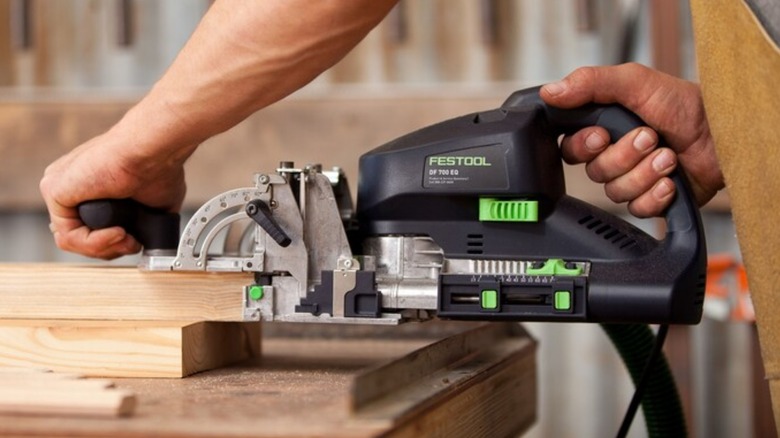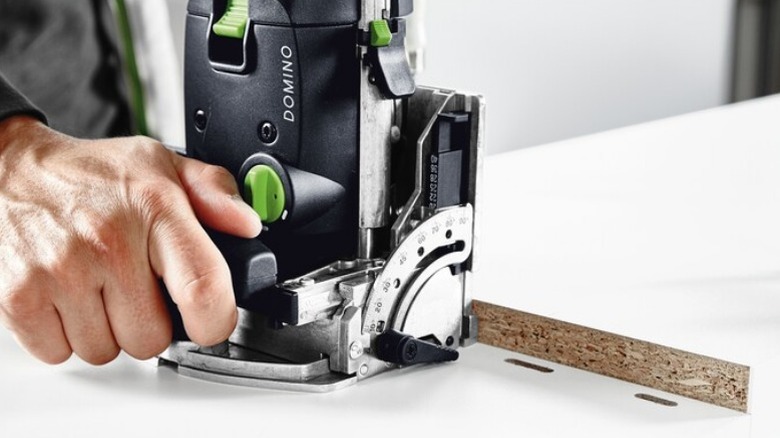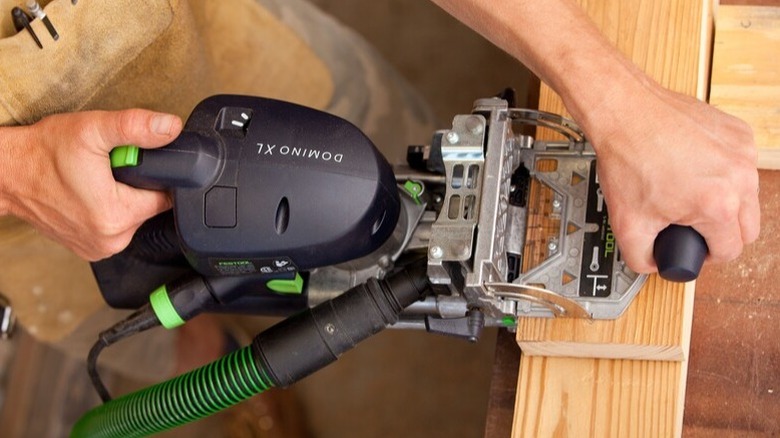Why The Festool Domino Joiner Is So Expensive & Is It Worth It For Woodworkers? Here's What Users Say
We may receive a commission on purchases made from links.
There comes a time in every woodworker's journey when they start looking at adding a few specialty tools to their collection. A good joiner is near the top of the list for most cabinet and furniture makers as it allows them to square edges for glue-ups and carve out slots for joinery. You can also use one to flatten the face of rough lumber before planing the other side or to correct boards that have grown warped in storage.
There are plenty of great woodworking tools available at Harbor Freight if you're looking to buy on a budget, but those of you who are more interested in procuring high-end tools may have stumbled across Festool's line of handheld Domino joiners. The company currently makes two models: the Domino Joiner DF 500, which retails for $1,279.00, and the Domino Joiner XL DF 700, which goes for $1,749.00.
This can understandably give some shoppers a bit of sticker shock. Just browse the aisles of your local hardware store and you'll probably find plate and biscuit joiners from a number of popular brands which can be had anywhere from $50 to $300. So why is Festool expecting its customers to shell out so much more for its joiners? Can the difference in quality really justify the exponential leap in cost? One of the best ways to find out is to take a look at what users have to say.
Why are Festool Domino Joiners so expensive?
There are a few reasons why Festool charges so much more. The first is that the Domino Joiner utilizes a structure comparable to mortise and tenon joining. This allows you to create a stronger bond in instances of end-grain-to-surface-grain contact, a larger surface area for a strong wood glue to make contact, and a mechanical interlocking of the wood which prevents twisting and pulling of the joint. When you add all of this up, it makes the Domino much stronger than a basic biscuit joint, which doesn't penetrate as far into the wood and will often form a looser fit in the carved cavity. This added strength is particularly beneficial in projects which need to bear heavy loads, such as tables, chairs, beds, sofas, shelves, and cabinets.
On top of that, Festool Domino Joiners are sold as kits which include additional accessories such as the carbide-tipped domino cutter, support bracket, trim stop, cross stop, spanner, and hard shell carrying case. This adds value to the set beyond that of the tool itself. The company also has a reputation for top-quality engineering. Festool is a premium German brand known for exceptional build quality, durability, efficiency, and precision. The Domino Joiner is designed for a professional market and its pricing reflects that.
But there are those who aren't so certain this is sufficient justification for the price. "I might sound contrarian — but a good dowel jig is maybe 50 bucks, and a nice biscuit joiner is 300, and the Festool... is not a thousand dollars better," said a Reddit contributor on a thread about the value of the tool.
Are Festool Domino Joiners worth the cost for woodworkers?
There are several sound arguments for why Domino joiners are better than the regular plate and biscuit variations sold by other brands, but the question of whether they're worth the cost largely depends on the needs of the consumer. Festool Domino joiners are primarily made for professional woodworkers: furniture makers, cabinet makers, door makers, etc. Those who make custom pieces or who mass produce handmade tables and chairs will have a much easier time justifying the added cost as a business expense due to the speed, simplicity, and strength of the joints made by Festool's product.
Hobbyists who want something to keep in their garage for the occasional joinery project will have a bit more trouble justifying the cost. "If you are making significant income from woodworking or money is no object, it's hard to argue against a Domino," said one Redditor. "If you aren't and it is, it's hard to argue against saving $1,500 and using a doweling jig."
Most woodworkers simply won't find it worthwhile to spend 10 times as much for a tool they'd only use on rare occasions -– especially when you consider that joints made by tools like the Makita Biscuit Joiner are more than adequate for the majority of applications. That said, there will always be a certain subset of woodworkers who are willing to pay top dollar to get the best tool available. "The Domino gives you time, repeatability, and precision in exchange for money," said another Reddit contributor. "There's a learning curve, but the tool is way more forgivable than marking gauges and chisels."


